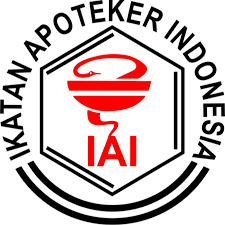Efektivitas Agen Pendeplesi GSH pada Sitotoksisitas Cisplatin terhadap Sel Kanker: Systematic Literature Review
Elisa Tri Oktaviyana(1*), Wahyu Utami(2)(1) Muhammadiyah University of Surakarta
(2) Muhammadiyah University of Surakarta
(*) Corresponding Author
Abstract
Keywords
Full Text:
PDFReferences
Benedetti B.T., Peterson E.J., Kabolizadeh P., Martínez A., Kipping R. and Farrell N.P., 2011, Effects of noncovalent platinum drug-protein interactions on drug efficacy: use of fluorescent conjugates as probes for drug metabolism., Molecular pharmaceutics, 8 (3), 940–948.
Chan S., Wang R., Man K., Nicholls J., Li H., Sun H. and Chan G.C.-F., 2019, A Novel Synthetic Compound, Bismuth Zinc Citrate, Could Potentially Reduce Cisplatin-Induced Toxicity Without Compromising the Anticancer Effect Through Enhanced Expression of Antioxidant Protein, Translational Oncology, 12 (5), 788–799.
Dasari S. and Bernard Tchounwou P., 2014, Cisplatin in cancer therapy: Molecular Mechanisms of Action, European Journal of Pharmacology, 740, 364–378.
Deng H., Ma J., Liu Y., He P. and Dong W., 2019, Combining α-Hederin with cisplatin increases the apoptosis of gastric cancer in vivo and in vitro via mitochondrial related apoptosis pathway, Biomedicine & Pharmacotherapy, 120, 109477.
Elkhoely, A. and Rehab Kamel., 2017, Diallyl sulfide alleviates cisplatin-induced nephrotoxicity in Rats via suppressing NF-κB downstream inflammatory proteins and p53/Puma signaling pathway, Clinical and Experimental Pharmacology and Physiology, 38(1), 42–49
Florea A.M. and Büsselberg D., 2011, Cisplatin as an anti-tumor drug: Cellular mechanisms of activity, drug resistance and induced side effects, Cancers, 3 (1), 1351–1371.
Ghosh S., 2019, Cisplatin: The first metal based anticancer drug, Bioorganic Chemistry, 88 (2019), 102925.
Jia Y., Zhang C., Zhou L., Xu H., Shi Y. and Tong Z., 2015, Micheliolide overcomes KLF4-mediated cisplatin resistance in breast cancer cells by downregulating glutathione., OncoTargets and therapy, 8, 2319–2327.
Komeda, S., 2019, Different Effects of Cisplatin and Transplatin on the Higher-Order Structure of DNA and Gene Expression, International Journal of Molecular Sciences, 21(34), 1-15.
Kim E.H., Baek S., Shin D., Lee J. and Roh J.-L., 2017, Hederagenin Induces Apoptosis in Cisplatin- Resistant Head and Neck Cancer Cells by Inhibiting the Nrf2-ARE Antioxidant Pathway., Oxidative medicine and cellular longevity, 2017, 5498908.
Kim E.H., Jang H. and Roh J.-L., 2016, A Novel Polyphenol Conjugate Sensitizes Cisplatin-Resistant Head and Neck Cancer Cells to Cisplatin via Nrf2 Inhibition., Molecular cancer therapeutics, 15 (11), 2620–2629.
Li Q., Zhan M., Chen W., Zhao B., Yang K., Yang J., Yi J., Huang Q., Mohan M., Hou Z. and Wang J., 2016, Phenylethyl isothiocyanate reverses cisplatin resistance in biliary tract cancer cells via glutathionylation-dependent degradation of Mcl-1., Oncotarget, 7 (9), 10271–10282.
Li Q., Yin X., Wang W., Zhan M., Zhao B., Hou Z. and Wang J., 2016, The effects of buthionine sulfoximine on the proliferation and apoptosis of biliary tract cancer cells induced by cisplatin and gemcitabine., Oncology letters, 11 (1), 474–480.
Liu Y., Lei H., Ma J., Deng H., He P. and Dong W., 2019, α-Hederin Increases The Apoptosis Of Cisplatin-Resistant Gastric Cancer Cells By Activating Mitochondrial Pathway In Vivo And Vitro., OncoTargets and therapy, 12, 8737–8750.
Oh Y.K., Yun J.H., Ark D.P., Oo E.Y. and Ang H.K., 2009, Apoptosis Inducing Activity of Fucoidan in HCT-15 Colon Carcinoma Cells, Biological and Pharmaceutical Bulletin, 32 (10), 1760–1764.
Roh J.-L., Kim E.H., Jang H. and Shin D., 2017, Nrf2 inhibition reverses the resistance of cisplatin- resistant head and neck cancer cells to artesunate-induced ferroptosis, Redox Biology, 11 (2017), 254– 262.
Sato, T. et al.,2004, Fas-Mediated Apoptosome Formation Is Dependent on Reactive Oxygen Species Derived from Mitochondrial Permeability Transition in Jurkat Cells, The Journal of Immunology, 173(1), 285–296.
Shin S.Y., Lee J.M., Lee M.S., Koh D., Jung H., Lim Y. and Lee Y.H., 2014, Targeting cancer cells via the reactive oxygen species-mediated unfolded protein response with a novel synthetic polyphenol conjugate, Clinical Cancer Research, 20 (16), 4302–4313.
Shelly C.Lu, M.D., 2014, Glutathione Synthesis, NIH Public Access, 1830 (5), 3143–3153.
Tewari-Singh N., Agarwal C., Huang J., Day B.J., White C.W. and Agarwal R., 2011, Efficacy of glutathione in ameliorating sulfur mustard analog-induced toxicity in cultured skin epidermal cells and in SKH-1 mouse skin in vivo, Journal of Pharmacology and Experimental Therapeutics, 336 (2), 450–459.
Yuniastuti, 2010, Dasar Molekuler Glutation dan Perannya Sebagai Antioksidan. Semarang: Penerbit FMIPA UNNES.
Zhang Z., Teruya K., Yoshida T., Eto H. and Shirahata S., 2013, Fucoidan extract enhances the anti- cancer activity of chemotherapeutic agents in MDA-MB-231 and MCF-7 breast cancer cells, Marine Drugs, 11 (1), 81–98.
Article Metrics
Abstract view(s): 1569 time(s)PDF: 2289 time(s)
Refbacks
- There are currently no refbacks.









